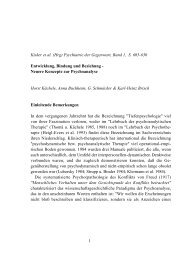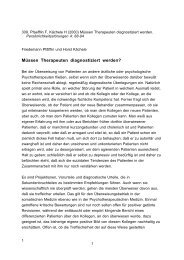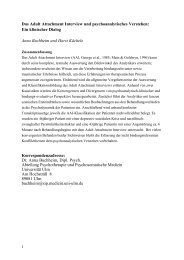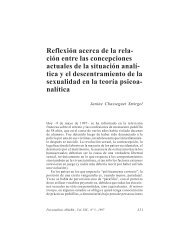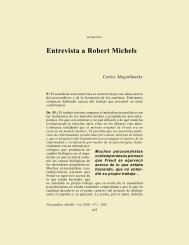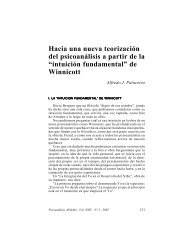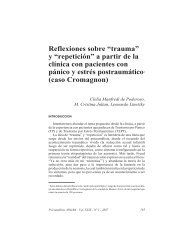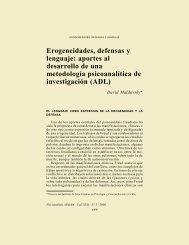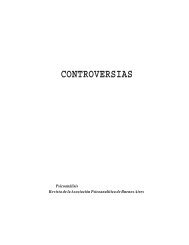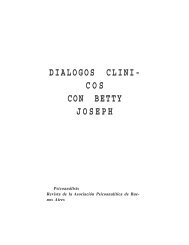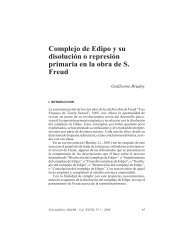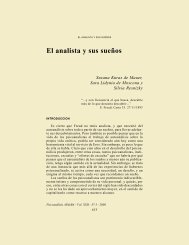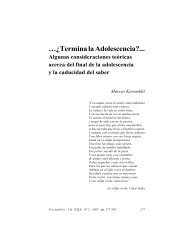- Page 1:
UNIVERSIDAD NACIONAL DE LA MATANZAS
- Page 4 and 5:
Pablo D. Slemenson“Lógica de lo
- Page 6 and 7:
Pablo D. Slemenson“Lógica de lo
- Page 9 and 10:
Pablo D. Slemenson“Lógica de lo
- Page 11 and 12:
Pablo D. Slemenson“Lógica de lo
- Page 13:
Pablo D. Slemenson“Lógica de lo
- Page 16 and 17:
Pablo D. Slemenson“Lógica de lo
- Page 18 and 19:
Pablo D. Slemenson“Lógica de lo
- Page 20 and 21:
Pablo D. Slemenson“Lógica de lo
- Page 22 and 23:
Pablo D. Slemenson“Lógica de lo
- Page 24 and 25:
Pablo D. Slemenson“Lógica de lo
- Page 26 and 27:
Pablo D. Slemenson“Lógica de lo
- Page 28 and 29:
Pablo D. Slemenson“Lógica de lo
- Page 30 and 31:
Pablo D. Slemenson“Lógica de lo
- Page 32 and 33:
Pablo D. Slemenson“Lógica de lo
- Page 34 and 35:
Pablo D. Slemenson“Lógica de lo
- Page 36 and 37:
Pablo D. Slemenson“Lógica de lo
- Page 38 and 39:
Pablo D. Slemenson“Lógica de lo
- Page 40 and 41:
Pablo D. Slemenson“Lógica de lo
- Page 42 and 43:
Pablo D. Slemenson“Lógica de lo
- Page 44 and 45:
Pablo D. Slemenson“Lógica de lo
- Page 46 and 47:
Pablo D. Slemenson“Lógica de lo
- Page 48 and 49:
Pablo D. Slemenson“Lógica de lo
- Page 50 and 51:
Pablo D. Slemenson“Lógica de lo
- Page 52 and 53:
Pablo D. Slemenson“Lógica de lo
- Page 54 and 55:
Pablo D. Slemenson“Lógica de lo
- Page 56 and 57:
Pablo D. Slemenson“Lógica de lo
- Page 58 and 59:
Pablo D. Slemenson“Lógica de lo
- Page 60 and 61:
Pablo D. Slemenson“Lógica de lo
- Page 62 and 63:
Pablo D. Slemenson“Lógica de lo
- Page 64 and 65:
Pablo D. Slemenson“Lógica de lo
- Page 66 and 67:
Pablo D. Slemenson“Lógica de lo
- Page 68 and 69:
Pablo D. Slemenson“Lógica de lo
- Page 70 and 71:
Pablo D. Slemenson“Lógica de lo
- Page 72 and 73:
Pablo D. Slemenson“Lógica de lo
- Page 74 and 75:
Pablo D. Slemenson“Lógica de lo
- Page 76 and 77:
Pablo D. Slemenson“Lógica de lo
- Page 78 and 79:
Pablo D. Slemenson“Lógica de lo
- Page 80 and 81:
Pablo D. Slemenson“Lógica de lo
- Page 82 and 83:
Pablo D. Slemenson“Lógica de lo
- Page 84 and 85:
Pablo D. Slemenson“Lógica de lo
- Page 86 and 87:
Pablo D. Slemenson“Lógica de lo
- Page 88 and 89:
Pablo D. Slemenson“Lógica de lo
- Page 90 and 91:
Pablo D. Slemenson“Lógica de lo
- Page 92 and 93:
Pablo D. Slemenson“Lógica de lo
- Page 94 and 95:
Pablo D. Slemenson“Lógica de lo
- Page 96 and 97:
Pablo D. Slemenson“Lógica de lo
- Page 98 and 99:
Pablo D. Slemenson“Lógica de lo
- Page 100 and 101:
Pablo D. Slemenson“Lógica de lo
- Page 102 and 103:
Pablo D. Slemenson“Lógica de lo
- Page 104 and 105:
Pablo D. Slemenson“Lógica de lo
- Page 106 and 107:
Pablo D. Slemenson“Lógica de lo
- Page 108 and 109:
Pablo D. Slemenson“Lógica de lo
- Page 110 and 111:
Pablo D. Slemenson“Lógica de lo
- Page 112 and 113:
Pablo D. Slemenson“Lógica de lo
- Page 114 and 115:
Pablo D. Slemenson“Lógica de lo
- Page 116 and 117:
Pablo D. Slemenson“Lógica de lo
- Page 118 and 119:
Pablo D. Slemenson“Lógica de lo
- Page 120 and 121:
Pablo D. Slemenson“Lógica de lo
- Page 122 and 123:
Pablo D. Slemenson“Lógica de lo
- Page 124 and 125:
Pablo D. Slemenson“Lógica de lo
- Page 126 and 127:
Pablo D. Slemenson“Lógica de lo
- Page 128 and 129:
Pablo D. Slemenson“Lógica de lo
- Page 130 and 131:
Pablo D. Slemenson“Lógica de lo
- Page 132 and 133:
Pablo D. Slemenson“Lógica de lo
- Page 134 and 135:
Pablo D. Slemenson“Lógica de lo
- Page 136 and 137:
Pablo D. Slemenson“Lógica de lo
- Page 138 and 139:
Pablo D. Slemenson“Lógica de lo
- Page 140 and 141:
Pablo D. Slemenson“Lógica de lo
- Page 142 and 143:
Pablo D. Slemenson“Lógica de lo
- Page 144 and 145:
Pablo D. Slemenson“Lógica de lo
- Page 146 and 147:
Pablo D. Slemenson“Lógica de lo
- Page 148 and 149:
Pablo D. Slemenson“Lógica de lo
- Page 150 and 151:
Pablo D. Slemenson“Lógica de lo
- Page 152 and 153:
Pablo D. Slemenson“Lógica de lo
- Page 154 and 155:
Pablo D. Slemenson“Lógica de lo
- Page 156 and 157:
Pablo D. Slemenson“Lógica de lo
- Page 158 and 159:
Pablo D. Slemenson“Lógica de lo
- Page 160 and 161:
Pablo D. Slemenson“Lógica de lo
- Page 162 and 163:
Pablo D. Slemenson“Lógica de lo
- Page 164 and 165:
Pablo D. Slemenson“Lógica de lo
- Page 166 and 167:
Pablo D. Slemenson“Lógica de lo
- Page 168 and 169:
Pablo D. Slemenson“Lógica de lo
- Page 170 and 171:
Pablo D. Slemenson“Lógica de lo
- Page 172 and 173:
Pablo D. Slemenson“Lógica de lo
- Page 174 and 175:
Pablo D. Slemenson“Lógica de lo
- Page 176 and 177:
Pablo D. Slemenson“Lógica de lo
- Page 178 and 179:
Pablo D. Slemenson“Lógica de lo
- Page 180 and 181:
Pablo D. Slemenson“Lógica de lo
- Page 182 and 183:
Pablo D. Slemenson“Lógica de lo
- Page 184 and 185:
Pablo D. Slemenson“Lógica de lo
- Page 186 and 187:
Pablo D. Slemenson“Lógica de lo
- Page 188 and 189:
Pablo D. Slemenson“Lógica de lo
- Page 190 and 191:
Pablo D. Slemenson“Lógica de lo
- Page 192 and 193:
Pablo D. Slemenson“Lógica de lo
- Page 194 and 195:
Pablo D. Slemenson“Lógica de lo
- Page 196 and 197:
Pablo D. Slemenson“Lógica de lo
- Page 198 and 199:
Pablo D. Slemenson“Lógica de lo
- Page 200 and 201:
Pablo D. Slemenson“Lógica de lo
- Page 202 and 203:
Pablo D. Slemenson“Lógica de lo
- Page 204 and 205:
Pablo D. Slemenson“Lógica de lo
- Page 206 and 207:
Pablo D. Slemenson“Lógica de lo
- Page 208 and 209:
Pablo D. Slemenson“Lógica de lo
- Page 210 and 211:
Pablo D. Slemenson“Lógica de lo
- Page 212 and 213:
Pablo D. Slemenson“Lógica de lo
- Page 214 and 215:
Pablo D. Slemenson“Lógica de lo
- Page 216 and 217:
Pablo D. Slemenson“Lógica de lo
- Page 218 and 219:
Pablo D. Slemenson“Lógica de lo
- Page 220 and 221:
Pablo D. Slemenson“Lógica de lo
- Page 222 and 223:
Pablo D. Slemenson“Lógica de lo
- Page 224 and 225:
Pablo D. Slemenson“Lógica de lo
- Page 226 and 227:
Pablo D. Slemenson“Lógica de lo
- Page 228 and 229:
Pablo D. Slemenson“Lógica de lo
- Page 230 and 231:
Pablo D. Slemenson“Lógica de lo
- Page 232 and 233:
Pablo D. Slemenson“Lógica de lo
- Page 234 and 235:
Pablo D. Slemenson“Lógica de lo
- Page 236 and 237:
Pablo D. Slemenson“Lógica de lo
- Page 238 and 239:
Pablo D. Slemenson“Lógica de lo
- Page 240 and 241:
Pablo D. Slemenson“Lógica de lo
- Page 242 and 243:
Pablo D. Slemenson“Lógica de lo
- Page 244 and 245:
Pablo D. Slemenson“Lógica de lo
- Page 246 and 247:
Pablo D. Slemenson“Lógica de lo
- Page 248 and 249:
Pablo D. Slemenson“Lógica de lo
- Page 250 and 251:
Pablo D. Slemenson“Lógica de lo
- Page 252 and 253:
Pablo D. Slemenson“Lógica de lo
- Page 254 and 255:
Pablo D. Slemenson“Lógica de lo
- Page 257 and 258:
Pablo D. Slemenson“Lógica de lo
- Page 259 and 260:
Pablo D. Slemenson“Lógica de lo
- Page 261:
Pablo D. Slemenson“Lógica de lo
- Page 264 and 265:
Pablo D. Slemenson“Lógica de lo
- Page 266 and 267:
Pablo D. Slemenson“Lógica de lo
- Page 268 and 269: Pablo D. Slemenson“Lógica de lo
- Page 270 and 271: Pablo D. Slemenson“Lógica de lo
- Page 272 and 273: Pablo D. Slemenson“Lógica de lo
- Page 274 and 275: Pablo D. Slemenson“Lógica de lo
- Page 276 and 277: Pablo D. Slemenson“Lógica de lo
- Page 278 and 279: Pablo D. Slemenson“Lógica de lo
- Page 280 and 281: Pablo D. Slemenson“Lógica de lo
- Page 282 and 283: Pablo D. Slemenson“Lógica de lo
- Page 284 and 285: Pablo D. Slemenson“Lógica de lo
- Page 286 and 287: Pablo D. Slemenson“Lógica de lo
- Page 288 and 289: Pablo D. Slemenson“Lógica de lo
- Page 290 and 291: Pablo D. Slemenson“Lógica de lo
- Page 293: Pablo D. Slemenson“Lógica de lo
- Page 296 and 297: Pablo D. Slemenson“Lógica de lo
- Page 298 and 299: Pablo D. Slemenson“Lógica de lo
- Page 300 and 301: Pablo D. Slemenson“Lógica de lo
- Page 302 and 303: Pablo D. Slemenson“Lógica de lo
- Page 304 and 305: Pablo D. Slemenson“Lógica de lo
- Page 306 and 307: Pablo D. Slemenson“Lógica de lo
- Page 308 and 309: Pablo D. Slemenson“Lógica de lo
- Page 310 and 311: Pablo D. Slemenson“Lógica de lo
- Page 312 and 313: Pablo D. Slemenson“Lógica de lo
- Page 314 and 315: Pablo D. Slemenson“Lógica de lo
- Page 316 and 317: Pablo D. Slemenson“Lógica de lo



